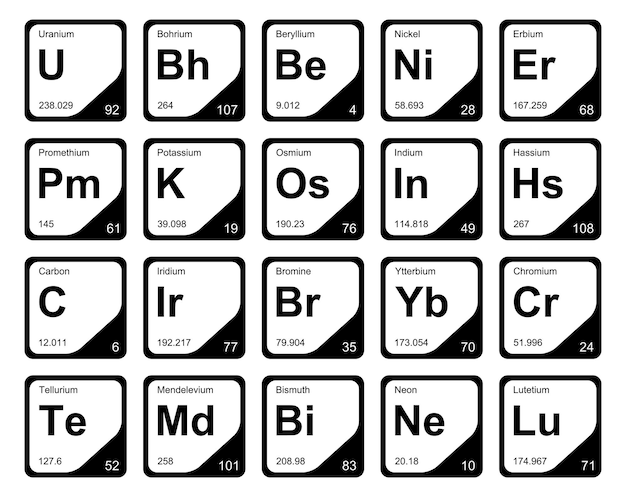

Beryllium is a lightweight metal that is incredibly strong and rigid, making it ideal for various applications.
Beryllium is the fourth element on the periodic table and has the symbol Be.
Beryllium is only found in the Earth’s crust in relatively small amounts, making it a rare element.
Beryllium has a unique combination of properties, including high thermal conductivity and low density.
Beryllium is transparent to X-rays, which makes it extremely useful in medical imaging devices.
Beryllium is highly resistant to corrosion, even when exposed to high temperatures or harsh chemicals.
Beryllium is used in the aerospace industry due to its strength-to-weight ratio, making it a crucial component for spacecraft and aircraft parts.
Beryllium is a silvery-white metal that is brittle at room temperature but becomes malleable at higher temperatures.
Beryllium has the highest melting point of all the lightweight metals.
Beryllium is an excellent conductor of electricity and is used in high-performance electrical connectors and switches.
Beryllium is essential in nuclear reactors as a neutron reflector, helping to control and contain the nuclear reaction.
Beryllium is used in the production of X-ray windows, where it allows the transmission of X-rays while protecting the vacuum inside the tube.
Beryllium is often alloyed with other metals, such as copper, to enhance their strength and conductivity.
Beryllium is toxic when inhaled as dust or fumes, and thus, strict safety measures are necessary when working with it.
Beryllium is mined primarily in the United States, China, and Kazakhstan.
Beryllium is used in the production of precision instruments, such as gyroscopes and optical instruments, due to its high stiffness and stability.
Beryllium alloys are commonly used in the defense industry for missiles, rockets, and other high-performance applications.
Beryllium has a unique ability to absorb large amounts of heat while maintaining its structural integrity, making it suitable for heat sinks and ceramic applications.
Beryllium is an essential component in the manufacturing of semiconductors, helping to improve efficiency and performance.
Beryllium-copper alloys are widely used in the automotive industry for components such as springs and electrical contacts.
Beryllium is highly transparent to infrared radiation, leading to its use in infrared-sensitive equipment.
Beryllium is named after the mineral beryl, which contains traces of the element.
Beryllium is six times lighter than steel but possesses significantly higher strength.
Beryllium is used in the production of spark-proof tools, as it does not produce sparks upon impact.
Beryllium’s low density makes it float in liquid mercury, making it an interesting demonstration in chemistry classes.
Beryllium has excellent dimensional stability, making it suitable for precise manufacturing applications.
Beryllium is used in the production of satellites due to its ability to withstand the extreme conditions of space.
Beryllium is a component in nuclear weapons, as it enhances the efficiency of the fission reaction.
Beryllium is highly transparent to X-ray and gamma radiation, making it valuable in the construction of radiation windows and chambers.
Beryllium is used in the nuclear power industry for its ability to absorb excess neutrons and reduce the risk of a nuclear meltdown.
Beryllium is a valuable material in the production of telescopes and microscopes due to its low thermal expansion and high rigidity.
Beryllium is considered a strategic material, as its use is critical in various defense and aerospace applications.
Beryllium is used in the production of dental fillings, as it provides strength and durability to the restoration.
Beryllium is an excellent reflector of X-ray radiation, leading to its use in X-ray telescopes and spectrometers.
Beryllium is used in the production of radiation windows for accelerators and particle detectors.
Beryllium’s low atomic number allows it to be highly transparent to high-energy X-rays and gamma rays, making it useful in detecting and measuring radiation.
Beryllium is of vital importance in the nuclear industry, as it helps to control nuclear reactions, ensuring safe and efficient power generation.
Beryllium is essential in the production of high-energy physics experiments, providing precision and reliability in particle detection.
Beryllium alloys are commonly used in the production of golf club heads, as they offer enhanced strength and performance.
Beryllium is used in the production of mirrors for scientific instruments, providing high reflectivity and stability.
Beryllium is essential in the production of semiconductors and electronic devices, contributing to the advancement of technology.
Beryllium is used in the production of connectors for fiber-optic cables, enabling high-speed and reliable data transmission.
Beryllium is used in the production of ceramic materials, providing high thermal conductivity and stability.
Beryllium is an integral component in the generation of nuclear power, helping to fuel electricity production worldwide.
Beryllium is an element that combines strength, thermal conductivity, and dimensional stability, making it a critical material for numerous technological advancements.
Around the world, coffee enthusiasts enjoy Monin coffee concentrate since it is a multipurpose product. Conveniently combining…
The Importance of Choosing the Right Shower for Your Bathroom Renovating your bathroom can be…
Usain Bolt holds the record for the fastest 100-meter sprint in history.Bolt was named Sportsman…
Love is in the air... and it smells suspiciously like chocolate!Roses are red, violets are…
Life's a beach, take a picture and relax.Sun, sand, and salty kisses. That's what beach…
Hungary is home to the largest thermal water cave system in the world.The Rubik's Cube…